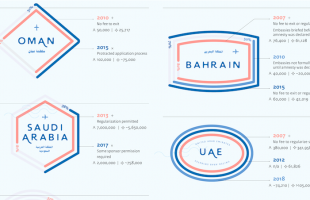The Philippines withdraws ban on the deployment of Filipino workers to 41 countries with poor working standards
This post is contributed to Migrant-Rights.org by Khara Jabola.
One week today, on November 2, 2011, the Philippines banned labor deployment to 41 migrant-hostile countries owing to their failure to pass certification standards set by the amended Migrant Workers and Overseas Filipinos Act of 1995. The move was taken as an unambiguous pledge not to continue sending Filipino citizens, like lambs to the slaughter, to countries that do not provide adequate legal protection for migrant workers. While the feasibility of the ban’s implementation has been widely questioned over the past week, the government’s strong language and concrete action in support of migrant rights was a welcome change even as lip service. The ban would have gone into effect in less than one week, on Nov. 17.
Oh, wait, never mind.
Earlier today, in a shameless about-face, the Philippine Department of Foreign Affairs (DFA) withdrew the 41 negative certifications that served as the basis for the ban despite the fact that a mere twenty-four hours prior, Carlos Cao, Chief of the Philippine Overseas Employment Agency (POEA), had announced to national news outlets that the list of banned countries was slated to increase after further review of an additional 31 flagged countries. Lack of coordination between the two government offices has created considerable confusion over who initiated the ban process and is being sourced as one motive force for the DFA to override POEA’s earlier decision to officially tag countries as unacceptable for Filipino workers.
The DFA and POEA are fully synchronized however in their treatment of Filipino workers as commodities. In press statements announcing the news, representatives of both offices use the language of dehumanization and refer to host nations as “receiving countries”.
The DFA intends to reassess the list of non-compliant states over the next 90 days. Although some labor rights advocates have expressed optimism that the deferral of the ban and loosened timeframe for review will allow for a more thorough and accurate certification process, additions, rather than subtractions from the list of non-compliants, seem doubtful. From the sounds of it, “revise” actually means whittle down: there have already been official hints at removing some negatively certified countries such as Libya, where rampant human trafficking and illegal recruitment of Filipino workers are known to occur unabated.
Over the three-month review process, during which the DFA will reclassify nations that comply with labor standards, iron out interagency cooperation, and liaise with “stakeholders” such as the recruitment industry, the government has not proposed any alternative plans to safeguard against the abuse of Filipino workers in the interim. There has been no talk of a media campaign advising prospective migrants against work in the countries under certification review and still no new program to expand opportunities for the un- and underemployed in the Philippines.
Ominously, the skepticism articulated in last week's postings on Migrant-Rights.org seem to be warranted.




